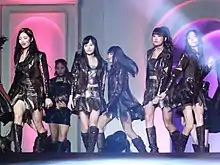Chinese idol
The Chinese music industry has a growing trends of idols and idol groups, entertainer manufactured and marketed for image, attractiveness. Idols are primarily singers (either as a member of a group or as a solo act), but they are also trained in other roles, such as acting, dancing, and modeling. Unlike other celebrities, idols are promoted through merchandise and endorsements by talent agencies while maintaining a carefully curated public image and social media presence, as well a strong emotional connection with a passionate fan base through concerts and meetups.

History
The 2010s saw the rise in popularity of Japanese-style idol groups such as SNH48 and male idols like TFBoys and WayV. Korean idol groups such as Exo, Suju-M and T-ARA also sought a larger audience through performances in China.
In the following years, a large number of idol groups debuted, beginning what media nicknamed the Age of the Idol.[1][2][3] On January 27, some members of SNH48 performed on the CCTV New Year's Gala 2017 as backup dancers during a segment with Coco Lee and JJ Lin. This was the first appearance by an idol group at a major Chinese event.
.JPG.webp)
Idol survival shows
Following the success of the Super Girl TV series in China, there has been a lack of female idol girl groups in the Chinese speaking world. So there was an open market in China for Survival shows. In 2018 there were many idol survival shows, such as like Produce 101 and Idol Producer,[4] through which Rocket Girls 101 and Nine Percent debuted.[5] Produce Camp 2019 appeared in 2019.[6]
There are two main brands that have sizable presence in the Chinese entertainment. They are Produce 101 China by Tencent and Idol Producer by iQiyi.
References
- "The Rise of Idol Economies in China".
- "China's Pop Idols are Too Soft for the Party".
- "China's Teen-Idol Obsession". www.caixinglobal.com.
- "偶练九人团出道!蔡徐坤范丞丞无悬念 林彦俊爆冷".
- http://www.iqiyi.com/a_19rrgxouw1.html?vfm=2008_aldbd. Missing or empty
|title=(help) - 簡, 子喬. "冠軍足足贏了第二名2300萬票! 《創造營2019》最終11人名單出爐". Yahoo奇摩名人娛樂. Yahoo. Retrieved 12 February 2020.